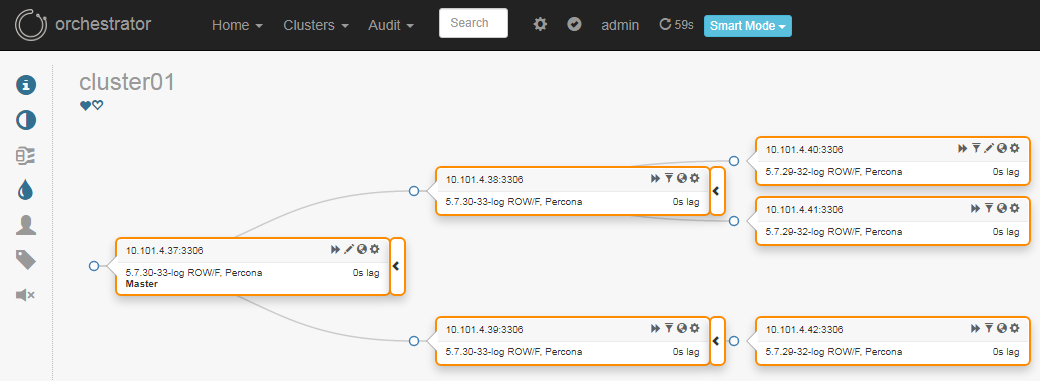Please note that the original design goal of this role was more concerned with the initial installation and bootstrapping environment, which currently does not involve performing continuous maintenance, and therefore are only suitable for testing and development purposes, should not be used in production environments. The author does not guarantee the accuracy, completeness, reliability, and availability of the role content. Under no circumstances will the author be held responsible or liable in any way for any claims, damages, losses, expenses, costs or liabilities whatsoever, including, without limitation, any direct or indirect damages for loss of profits, business interruption or loss of information.
请注意,此角色的最初设计目标更关注初始安装和引导环境,目前不涉及执行连续维护,因此仅适用于测试和开发目的,不应在生产环境中使用。作者不对角色内容之准确性、完整性、可靠性、可用性做保证。在任何情况下,作者均不对任何索赔,损害,损失,费用,成本或负债承担任何责任,包括但不限于因利润损失,业务中断或信息丢失而造成的任何直接或间接损害。
Table of Contents
- Overview
- Task Specifications
- Requirements
- Role variables
- Dependencies
- Example Playbook
- License
- Author Information
- Contributors
- Donations
MySQL is an open-source relational database management system (RDBMS). A relational database organizes data into one or more data tables in which data types may be related to each other; these relations help structure the data. SQL is a language programmers use to create, modify and extract data from the relational database, as well as control user access to the database. In addition to relational databases and SQL, an RDBMS like MySQL works with an operating system to implement a relational database in a computer's storage system, manages users, allows for network access and facilitates testing database integrity and creation of backups.
Percona Server for MySQL is a free, fully compatible, enhanced and open-source drop-in replacement for any MySQL database. It provides superior performance, scalability and instrumentation. Percona Server for MySQL is trusted by thousands of enterprises to provide better performance and concurrency for their most demanding workloads and delivers greater value to MySQL server users with optimized performance, greater performance scalability and availability, enhanced backups and increased visibility.
Group-based replication is a technique that can be used to implement fault-tolerant systems. The replication group is a set of servers that interact with each other through message passing. The communication layer provides a set of guarantees such as atomic message delivery and total ordering of messages. These are powerful primitives and abstractions that allow building more advanced database replication solutions.
Orchestrator is a MySQL topology manager and a failover solution, runs as a service and provides command line access, HTTP API and Web interface. used in production on many large MySQL installments. It allows for detecting, querying and refactoring complex replication topologies, and provides reliable failure detection and intelligent recovery and promotion.
- Installation type
- Standalone.
- Replication with orchestrator management.
- Group Replication.
- Configuration
- Buffer Pool Size, Connections, Character set and other general parameters.
- Networking and Firewall.
- Resource limiting.
- Cluster member relationship.
- Customized database.
- Privilege management.
- SQL Mode.
- Backup
- Scheduled full and incremental backups.
- Compressed backups.
- Cloud storage backups.
- Monitoring
- Status.
- Variables.
- Databases.
- Table.
- Query.
- Replication.
- Analyzing
- Query execution logging.
- Grouped by fingerprint and reported in descending order of query.
- Security Safeguard Benchmark
- Transparent Data Encryption (TDE) protects your critical data by enabling data-at-rest encryption in the database. It protects the privacy of your information, prevents data breaches and helps meet regulatory requirements.
- Supports secure (encrypted) connections between clients and the server using the Transport Layer Security (TLS) protocol.
- Encrypt/decrypt local or streaming backup in order to add another layer of protection to the backups.
- File system permissions protected when potential vulnerability exists.
- Authentication management makes IT infrastructures more secure by leveraging existing security rules and processes.
- Ensure the test database is not installed.
- Auditing provides monitoring and logging of connection and query activity that was performed on the MySQL server. Information will be transferred to the SIEM subsection like Graylog or ELK stack.
- Failover
- Supports the automatic failover of the master, and the replication tree can be fixed when servers in the tree fail either manually.
The mysqld service must be disabled and can only be started manually if orchestrator replication management is used. see openark/orchestrator#891.
There are some files that record MySQL account password for replication, xtrabackup and prometheus in /tmp folder at the first master node, Burn after reading!
This Ansible role installs Percona Server for MySQL on Linux operating system, including establishing a filesystem structure and server configuration with some common operational features, Will works on the following operating systems:
- CentOS 7
The following list of supported the MySQL releases:
- MySQL Community Server 5.7
- Percona Server for MySQL 5.7
There are some variables in defaults/main.yml which can (Or needs to) be overridden:
mysql_releases: Define MySQL distribution.mysql_version: Specify the MySQL version.mysql_path: Specify the MySQL data directory.mysql_user: System user name for running mysqld services.mysql_mailto: MySQL report mail recipient.mysql_sa_pass: MySQL root account password.mysql_ssl: A boolean to determine whether or not Encrypting client and cluster communications.mysql_storage_engine: Preferred storage engine, InnoDB or MyISAMmysql_innodb_buffer_pool_size: The size in MB of the buffer pool.mysql_max_connections: The maximum permitted number of simultaneous client connections.mysql_system_type: Define instance parameters.
mysql_cluster_mode: Defines type of cluster type: standalone / replication / mgr.mysql_cluster_mgmt: MySQL high availability and replication management tool.
mysql_cluster_mgr_mode: Defines mode of group replication, single or multi-primary.
mysql_orchestrator_dept: A boolean to determine whether or not use Orchestrator at the same environment.
mysql_orchestrator_ui_user: Management console authentication user.mysql_orchestrator_ui_pass: Management console authentication password.mysql_orchestrator_ui_ssl: A boolean to determine whether or not Encrypting client communications.mysql_orchestrator_port_ui: Orchestrator Web UI listen port.mysql_orchestrator_port_agent: Orchestrator Agent listen port.mysql_orchestrator_port_raft: Orchestrator Raft listen port.mysql_orchestrator_mysql_user: MySQL topology control account name.mysql_orchestrator_mysql_pass: MySQL topology control account password.
mysql_backupset_arg.life: Lifetime of the latest full backup in seconds.mysql_backupset_arg.keep: The number of full backups (and its incrementals) to keep.mysql_backupset_arg.encryptkey: BackupSet encryption key, Generate by [openssl rand -base64 24].mysql_backupset_arg.cloud_rsync: Whether rsync for cloud storage.mysql_backupset_arg.cloud_drive: Specify the cloud storage providers.mysql_backupset_arg.cloud_bwlimit: Controls the bandwidth limit.mysql_backupset_arg.cloud_event: Define transfer events.mysql_backupset_arg.cloud_config: Specify the cloud storage configuration.
mysql_port_mysqld: MySQL instance listen port.mysql_port_mgr: MySQL group replication listen port.mysql_port_exporter: Prometheus MySQL Exporter listen port.
mysql_arg.binlog_cache_size: Size of the cache to hold changes to the binary log during a transaction.mysql_arg.binlog_format: The binary logging format.mysql_arg.binlog_stmt_cache_size: Size of the cache for the binary log to hold nontransactional statements issued during a transaction.mysql_arg.character_set: Server's default character set.mysql_arg.connect_timeout: Server waits for a connect packet in seconds.mysql_arg.data_encryption: A boolean to determine whether or not to enabled the MySQL Data at Rest Encryption.mysql_arg.default_time_zone: Default server time zone.mysql_arg.expire_logs_days: The number of days for automatic binary log file removal.mysql_arg.enforce_gtid_consistency: Enforces GTID consistency by allowing execution of only statements that can be safely logged using a GTID.mysql_arg.gtid_mode: Controls whether GTID based logging is enabled and what type of transactions the logs can contain.mysql_arg.lower_case_table_names: Affects how the server handles identifier case sensitivity.mysql_arg.innodb_buffer_pool_instances: The number of regions that the InnoDB buffer pool is divided into.mysql_arg.innodb_flush_log_at_trx_commit: Controls the balance between strict ACID compliance for commit operations and higher performance.mysql_arg.innodb_log_buffer_size: Size in MB of the buffer that InnoDB uses to write to the log files on disk.mysql_arg.innodb_log_file_size: The size in MB of each log file in a log group.mysql_arg.innodb_max_dirty_pages_pct: A target for flushing activity.mysql_arg.innodb_max_undo_log_size: The size in MB of undo tablespaces.mysql_arg.innodb_page_cleaners: The number of page cleaner threads that flush dirty pages from buffer pool instances.mysql_arg.innodb_purge_threads: The number of background threads devoted to the InnoDB purge operation.mysql_arg.innodb_read_io_threads: The number of I/O threads for read operations in InnoDB.mysql_arg.innodb_write_io_threads: The number of I/O threads for write operations in InnoDB.mysql_arg.interactive_timeout: Server waits for activity on an interactive connection in seconds.mysql_arg.join_buffer_size: Size of the buffer that is used for index scans.mysql_arg.key_buffer_size: Size of the buffer used for MyISAM tables index blocks in MB.mysql_arg.log_queries_not_using_indexes: Logs whether queries that do not use indexes.mysql_arg.long_query_time: Logs query that executes longer than in seconds.mysql_arg.max_allowed_packet: The maximum size of one packet.mysql_arg.max_connect_errors: Limits the maximum number of interrupted without a successful connection.mysql_arg.max_heap_table_size: The maximum size to which user-created MEMORY tables are permitted to grow.mysql_arg.max_prepared_stmt_count: Limits the total number of prepared statements in the server.mysql_arg.open_files_limit: The number of files that the operating system permits MySQL to open.mysql_arg.open_nproc_limit: The number of processes launched by systemd.mysql_arg.performance_schema_max_table_instances: The maximum number of instrumented table objects.mysql_arg.query_cache_size: Query cache size.mysql_arg.query_cache_type: Query cache type.mysql_arg.read_rnd_buffer_size: Size of the buffer that is used for reading rows in sorted order.mysql_arg.slave_net_timeout: The number of seconds to wait for more data from the master before the slave.mysql_arg.sync_binlog: Controls how often the MySQL server synchronizes the binary log to disk.mysql_arg.table_definition_cache: The number of table definitions that can be stored in the definition cache.mysql_arg.table_open_cache: The number of open tables for all threads.mysql_arg.table_open_cache_instances: The number of open tables cache instances.mysql_arg.thread_cache_size: How many threads the server should cache for reuse.mysql_arg.thread_handling: The thread-handling model used by the server for connection threads.mysql_arg.thread_pool_size: Define the number of threads that can use the CPU at the same time.mysql_arg.thread_pool_max_threads: The maximum number of threads in the thread pool.mysql_arg.thread_pool_oversubscribe: How many worker threads in a thread group can remain active at the same time once a thread group is oversubscribed due to stalls.mysql_arg.tmp_table_size: The maximum size of internal in-memory temporary tables.mysql_arg.wait_timeout: Server waits for activity on a noninteractive connection in seconds.
environments: Define the service environment.datacenter: Define the DataCenter.domain: Define the Domain.customer: Define the customer name.tags: Define the service custom label.exporter_is_install: Whether to install prometheus exporter.consul_public_register: Whether register a exporter service with public consul client.consul_public_exporter_token: Public Consul client ACL token.consul_public_http_prot: The consul Hypertext Transfer Protocol.consul_public_clients: List of public consul clients.consul_public_http_port: The consul HTTP API port.
There are some variables in vars/main.yml:
mysql_kernel_parameters: Operating system variables.mysql_conf_scripts: Specify the MySQL configure and script files.mysqld_exporter_collector: Prometheus mysqld exporter collector flags.mysql_sql_mode: Specify value the global SQL mode.mysql_audit_log_commands: Filtering command for audit process.
- Ansible versions >= 2.8
- Python >= 2.7.5
- Orchestrator
See tests/inventory for an example.
[MySQL]
node01 ansible_host='192.168.1.10'
node02 ansible_host='192.168.1.11'
node03 ansible_host='192.168.1.12'
[MySQL:vars]
mysql_version='57'
mysql_cluster_mode='replication'
Including an example of how to use your role (for instance, with variables passed in as parameters) is always nice for users too:
- hosts: all
roles:
- role: ansible-role-linux-mysql
mysql_version: '57'You can also use the group_vars or the host_vars files for setting the variables needed for this role. File you should change: group_vars/all or host_vars/group_name.
mysql_releases: 'Percona'
mysql_version: '57'
mysql_path: '/data'
mysql_user: 'mysql'
mysql_mailto: 'somebody@example.com'
mysql_sa_pass: 'changeme'
mysql_ssl: false
mysql_storage_engine: 'InnoDB'
mysql_innodb_buffer_pool_size: '1024'
mysql_max_connections: '100'
mysql_system_type: 'autopilot'
mysql_cluster_mode: 'standalone'
mysql_cluster_mgmt: ''
mysql_orchestrator_dept: false
mysql_orchestrator_ui_user: 'admin'
mysql_orchestrator_ui_pass: 'changeme'
mysql_orchestrator_ui_ssl: true
mysql_orchestrator_port_ui: '3002'
mysql_orchestrator_port_agent: '3003'
mysql_orchestrator_port_raft: '10008'
mysql_orchestrator_mysql_user: 'orchestrator'
mysql_orchestrator_mysql_pass: 'changeme'
mysql_backupset_arg:
life: '604800'
keep: '2'
encryptkey: 'Un9FA+CgxM5Yr/MpwTh5s6NXSQE0brp8'
cloud_rsync: true
cloud_drive: 'azureblob'
cloud_bwlimit: '10M'
cloud_event: 'sync'
cloud_config:
account: 'blobuser'
key: 'base64encodedkey=='
endpoint: 'blob.core.chinacloudapi.cn'
mysql_port_mysqld: '3306'
mysql_port_mgr: '33061'
mysql_port_exporter: '9104'
mysql_arg:
binlog_cache_size: '1048576'
binlog_format: 'ROW'
binlog_stmt_cache_size: '1048576'
character_set: 'utf8mb4'
connect_timeout: '30'
data_encryption: false
default_time_zone: '+8:00'
expire_logs_days: '15'
enforce_gtid_consistency: 'on'
gtid_mode: 'on'
lower_case_table_names: '0'
innodb_buffer_pool_instances: '8'
innodb_flush_log_at_trx_commit: '2'
innodb_log_buffer_size: '16'
innodb_log_file_size: '1024'
innodb_max_dirty_pages_pct: '85'
innodb_max_undo_log_size: '1024'
innodb_page_cleaners: '4'
innodb_purge_threads: '4'
innodb_read_io_threads: '4'
innodb_write_io_threads: '4'
interactive_timeout: '3600'
join_buffer_size: '1M'
key_buffer_size: '32'
log_queries_not_using_indexes: '1'
long_query_time: '1'
max_allowed_packet: '32M'
max_connect_errors: '100'
max_heap_table_size: '32M'
max_prepared_stmt_count: '262144'
open_files_limit: '131072'
open_nproc_limit: '131072'
performance_schema_max_table_instances: '512'
query_cache_size: '0'
query_cache_type: '0'
read_rnd_buffer_size: '1M'
slave_net_timeout: '10'
sync_binlog: '1000'
table_definition_cache: '4096'
table_open_cache: '4096'
table_open_cache_instances: '64'
thread_cache_size: '50'
thread_handling: 'pool-of-threads'
thread_pool_size: '16'
thread_pool_max_threads: '1000'
thread_pool_oversubscribe: '10'
tmp_table_size: '32M'
wait_timeout: '3600'
environments: 'prd'
datacenter: 'dc01'
domain: 'local'
customer: 'demo'
tags:
subscription: 'default'
owner: 'nobody'
department: 'Infrastructure'
organization: 'The Company'
region: 'China'
exporter_is_install: false
consul_public_register: false
consul_public_exporter_token: '00000000-0000-0000-0000-000000000000'
consul_public_http_prot: 'https'
consul_public_http_port: '8500'
consul_public_clients:
- '127.0.0.1'Please send your suggestions to make this role better.
Please donate to the following monero address.
46CHVMbb6wQV2PJYEbahb353SYGqXhcdFQVEWdCnHb6JaR5125h3kNQ6bcqLye5G7UF7qz6xL9qHLDSAY3baagfmLZABz75




